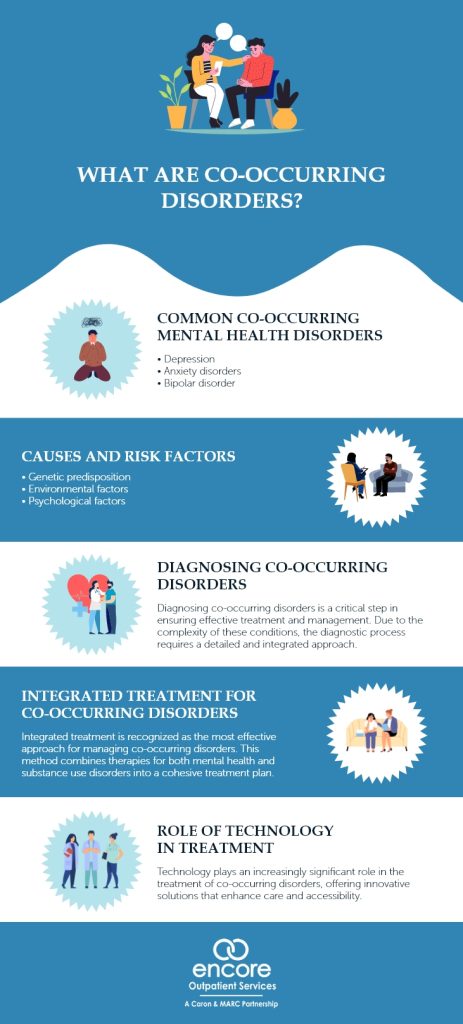Our dedication lies not just in treating symptoms but in addressing the root causes, offering a holistic approach that integrates the best of therapeutic practices with the warmth of community support.
What Are Co-Occurring Disorders?

Co-occurring disorder is a term that resonates deeply within the spheres of mental health and addiction treatment. It refers to the presence of both a mental health disorder and a substance use disorder in an individual. Its significance lies in the complexity and interplay between these coexisting conditions, each potentially influencing and exacerbating the other. The global prevalence of co-occurring disorders is significant, as they affect a considerable proportion of the population. Understanding these disorders is crucial, as they often present unique challenges in diagnosis, treatment, and management. This is primarily due to the overlapping symptoms and the intricate ways in which mental health and substance use disorders interact. By gaining insight into co-occurring disorders, we empower ourselves to seek appropriate care and support, thereby enhancing the effectiveness of treatment outcomes and improving overall quality of life.
Common Co-Occurring Mental Health Disorders
Co-occurring disorders involve a complex interplay between mental health conditions and substance use disorders. Here are some of the most prevalent mental health conditions found in co-occurring disorders:
- Depression – Characterized by persistent feelings of sadness, hopelessness, and a lack of interest in daily activities. Individuals with depressive disorders may turn to substance use as a form of self-medication.
- Anxiety Disorders – Conditions like generalized anxiety disorder (GAD), panic disorder, or social anxiety disorder (SAD) frequently co-occur with substance use disorders. Substance use may be an attempt to self-medicate anxiety symptoms.
- Bipolar Disorder – This condition involves episodes of mood swings ranging from depressive lows to manic highs. Substance use is often a coping mechanism for these extreme mood shifts.
- Post-Traumatic Stress Disorder (PTSD) – PTSD develops after exposure to traumatic life events and is characterized by severe anxiety, flashbacks, and uncontrollable thoughts about the event. Substance use can be a way to numb or escape these distressing symptoms.
- Schizophrenia and Other Psychotic Disorders – A severe mental health disorder characterized by distortions in thinking, perception, emotions, language, sense of self, and behavior. Drugs and alcohol may be used in an attempt to self-medicate.
- Attention-Deficit/Hyperactivity Disorder (ADHD) – A condition characterized by problems with focus, hyperactivity, and impulsiveness. Individuals with ADHD may misuse stimulants and other substances either as a form of self-medication or due to impulsive behaviors.
- Personality Disorders – Conditions like borderline personality disorder (BPD) or antisocial personality disorder (ASPD) may occur alongside substance use disorders, contributing to issues with interpersonal relationships and impulse control.
- Eating Disorders – Disorders like anorexia nervosa, bulimia nervosa, and binge eating disorder often co-occur with substance use disorders, especially in attempts to control weight or cope with emotional distress.
Recognizing these mental health conditions is a pivotal step in identifying and treating co-occurring disorders. Each condition presents unique challenges that require an integrated treatment approach to address both the mental health and substance use challenges concurrently.

Causes and Risk Factors
Several risk factors contribute to the development of co-occurring disorders. Understanding these risk factors is pivotal for prevention and effective treatment. The primary causes and common risk factors include:
- Genetic Predisposition – A family history of mental health conditions or substance use disorders heightens the likelihood of an individual developing co-occurring disorders due to genetic factors.
- Brain Chemistry – Imbalances in neurotransmitters, chemicals in the brain responsible for mood and behavior, can contribute to the development of co-occurring disorders.
- Environmental Factors – Exposure to stressful or traumatic events, especially during childhood, can increase the risk of developing co-occurring disorders. This includes experiences such as abuse, neglect, or witnessing violence.
- Social Factors – Factors like peer pressure, social isolation, and lack of social support can contribute to the development of substance use disorders and exacerbate existing mental health conditions.
- Psychological Factors – Personal traits such as low self-esteem, chronic stress, and coping difficulties can predispose individuals to mental health disorders, with substance use challenges often emerging as a coping mechanism.
- Developmental Factors – Early exposure to substance use or traumatic experiences during critical developmental stages can increase the risk of co-occurring disorders later in life.
- Pre-existing Mental Health Disorders – Individuals with an existing mental health condition are at a higher risk of developing substance abuse disorders. Similarly, those with substance use disorders are more likely to develop mental health conditions.
It’s important to note that the presence of these risk factors does not guarantee the development of co-occurring disorders; they simply increase the likelihood.
Understanding these causes and risk factors is essential in creating effective prevention strategies and in tailoring treatment plans for those affected by co-occurring disorders.
Diagnosing Co-Occurring Disorders
Diagnosing co-occurring disorders is a critical step in ensuring effective treatment and management. Due to the complexity of these conditions, the diagnostic process requires a detailed and integrated approach:
- Comprehensive Evaluation – Initial assessment involves a thorough review of the individual’s medical, psychological, and substance use history. Healthcare professionals may conduct interviews, questionnaires, or use standardized assessment tools to gather information.
- Identifying Symptoms of Both Disorders – Diagnosticians look for signs of mental health disorders, such as mood disturbances, changes in behavior, or cognitive impairments. Simultaneously, they assess for symptoms of substance abuse, including cravings, withdrawal symptoms, and impact on daily functioning.
- Differentiating Between Disorders – A key challenge is distinguishing symptoms of mental health disorders from those caused by substance use or withdrawal. Healthcare professionals must determine whether mental health symptoms precede substance abuse or vice versa or if they occur independently.
- Use of Diagnostic Criteria – Diagnoses are made based on established criteria, such as the Diagnostic and Statistical Manual of Mental Disorders (DSM). This ensures a standardized approach to identifying and categorizing symptoms.
- Consideration of Coexisting Factors – Factors such as family history, social environment, and previous treatment experiences are considered. These factors can provide insight into the development and progression of co-occurring disorders.
- Continuous Monitoring and Reassessment – Diagnosing co-occurring disorders is not a one-time event. Continuous monitoring and reassessment are essential, as symptoms and conditions can change over time.
- Interdisciplinary Approach – Effective diagnosis often involves a team of professionals, including psychologists, psychiatrists, and counselors. An interdisciplinary approach ensures a holistic understanding of the individual’s condition.
Diagnosing co-occurring disorders is a meticulous process that plays a pivotal role in crafting an effective treatment plan. Accurate diagnosis paves the way for integrated care that addresses both the mental health and substance use aspects of the disorders, leading to better outcomes for the individual.
Integrated Treatment for Co-Occurring Disorders
Integrated treatment is recognized as the most effective approach for managing co-occurring disorders. This method combines therapies for both mental health and substance use disorders into a cohesive treatment plan. The key components of integrated treatment include:
- Coordinated Care – Treatment involves a team of professionals, including psychiatrists, addiction specialists, and counselors, working together to provide comprehensive care. Coordination among these professionals ensures consistency in treatment goals and strategies.
- Personalized Treatment Plans – Each individual’s treatment plan is tailored to their specific needs, taking into account the nature and severity of their disorders. Plans are flexible and adaptable, allowing for adjustments as the individual progresses.
- Combination of Therapies – Integrated treatment often includes a combination of psychotherapy, medication management, and support services. Psychotherapy approaches like cognitive behavioral therapy (CBT) and dialectical behavior therapy (DBT) address both mental health symptoms and substance use challenges.
- Medication Management – Medications may be prescribed to manage symptoms of mental health disorders and to support recovery from substance use disorders. Close monitoring of medication effectiveness and side effects is an essential part of the treatment.
- Trauma–Informed Care – Integrated treatment includes trauma-informed approaches to address underlying trauma that may contribute to the development or exacerbation of co-occurring disorders.
- Education and Support – Education about co-occurring disorders is provided to individuals and their families to enhance understanding and support recovery. Support groups and family therapy can play a vital role in providing a supportive network.
- Relapse Prevention – Strategies to prevent relapse are integral to treatment, including identifying triggers and developing coping skills. Ongoing support and follow-up care are crucial for maintaining long-term recovery.
- Holistic Focus – Treatment addresses not just the disorders but also related areas of life, such as physical health, social skills, and vocational support. This holistic focus aids in improving the overall quality of life and sustaining recovery.
Integrated treatment for co-occurring disorders recognizes the interdependence of mental health and substance use disorders. By treating both conditions simultaneously, this approach aims to provide more effective and lasting outcomes, ultimately leading to better overall health and well-being.
Role of Technology in Treatment
Technology plays an increasingly significant role in the treatment of co-occurring disorders, offering innovative solutions that enhance care and accessibility. The integration of technology into treatment strategies has brought several key advancements:
- Telehealth Services – Telehealth provides remote access to mental health and addiction treatment services, making it easier for individuals to receive consistent care. This is particularly beneficial for those in remote or underserved areas.
- Mobile Health Applications – Smartphone apps offer tools for self-monitoring, medication reminders, and crisis management. These apps can support ongoing treatment plans, allowing patients to track symptoms and progress.
- Online Therapy and Counseling – Virtual therapy sessions enable patients to connect with healthcare professionals from the comfort of their homes, ensuring continuity of care and flexibility in scheduling.
- Wearable Technology – Wearable devices can monitor physiological indicators such as heart rate and sleep patterns, providing valuable data that can inform treatment decisions and adjustments.
- Digital Educational Resources – Online platforms and resources offer educational material about co-occurring disorders, helping patients and their families understand and manage these conditions effectively.
- Online Therapy Platforms – Interactive e-therapy platforms provide structured therapeutic programs, combining elements of traditional therapy with digital convenience and accessibility.
- Virtual Support Groups – Online support groups and forums allow individuals to connect with others experiencing similar challenges, fostering a sense of community and shared understanding.
The role of technology in the treatment of co-occurring disorders is evolving rapidly, offering innovative and effective ways to augment traditional treatment methods. These technological tools enhance patient engagement, improve access to care, and contribute to more personalized and effective treatment strategies.
If you or someone you know is navigating the challenges of addiction and co-occurring mental health conditions, consider reaching out to Encore Outpatient Services in the Washington D.C. Metro area. As a licensed treatment provider, Encore specializes in addressing both addiction and mental health conditions through a coordinated, integrated approach. With experienced professionals dedicated to providing high-quality care, Encore Outpatient Services is well-equipped to give patients a strong start on their journey toward healing and long-term wellness. Benefit from comprehensive and collaborative treatment options that address the complexities of your unique situation. Don’t hesitate to take this important step in seeking support and beginning your path to recovery.
Let Us Support You On Your Recovery Journey!
Copyright 2025 Encore Outpatient Services | All Rights Reserved



